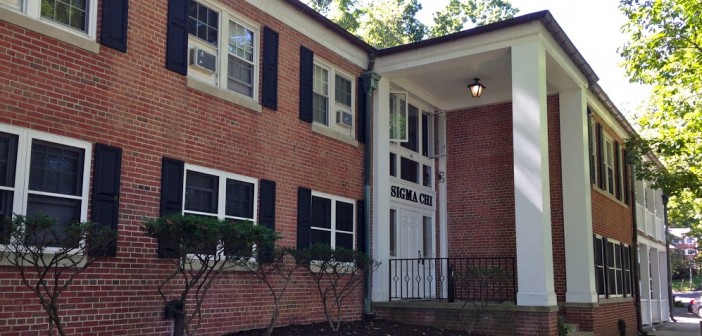The Fraternity Management Association, a company that provided 13 Lehigh fraternities and two sororities with financial services and management, stopped operating this past March, leaving the Greek chapters with debts unpaid and money lost. Six months later, the affected Lehigh organizations are still recovering, but have moved forward with new methods for organizing and spending funds.
When the FMA declared it was no longer operating, some chapters had to let their chefs go and give up philanthropy and social events for which they’d already planned and budgeted. Many chapters, however, were fortunate enough to receive donations from their alumni associations and pay their debts.
The FMA operates independently of Lehigh and is contracted by the Greek chapters. When vendors were not receiving payments, they tried calling the FMA but received no response, according to Director of Fraternity and Sorority Affairs Tim Wilkinson. That was when the vendors reached out to the university, calling Wilkinson and Director of Residential Services Ozzie Breiner. Wilkinson said that he and Breiner talked and realized that something did not make sense.
Because the OFSA works with the Lehigh Greek chapters and not with the FMA directly, Wilkinson sent out a memo to the affected Greek chapters that had been receiving phone calls from their vendors about not receiving payments. Wilkinson suggested these chapters reach out to the FMA.
After alumni contacted the FMA, Betty Fisher, its director, sent a memo to all affected chapters essentially stating the organization could not pay its finances and intended to declare bankruptcy. At that point, Wilkinson said, the alumni and chapters convened and called an emergency board meeting.
“We were left with absolutely no money to operate with,” said James Marshall, ’15, who was previously finance chair of Sigma Chi fraternity. “Not only did we lose our money for philanthropy events and date parties, we also lost the funds that were used for food and even around $50,000 in savings.”
Many house chefs were also affected by the losses. Sigma Chi was able to keep their chef for a fraction of their usual meals, Marshall said. Alpha Tau Omega fraternity’s president at the time, Jared Turpen, ’15, said his chapter discovered “that our chef of thirty years and friend, Rodney, and his wife had not had their health insurance paid.”
The chapter and its alumni set up a donation site and, through both alumni and family donations, was able to pay its chef his normal salary, buy enough food for him to cook two meals a week and pay the most pressing bills, Turpen said. However, he said that the money they had budgeted for events was gone.
“So we were held back from participating in a lot of things,” Turpen said.
The FMA was not responsive to vendors or chapters.
“We were simply told no when we asked for our financial documents,” Turpen said.
The FMA was a private company with paid staff members, but it also had a board of directors. According to Wilkinson, that board was not actually elected, but instead simply appointed. The alumni and members of the affected groups united to elect a new board, giving the elected board the power to remove staff members and gain access to the FMA and all of its records, according to Wilkinson. Turpen said they enacted their treasurer at the time as the temporary executive director of the FMA. Subsequently, Theta Chi alumnus Gary Tilles stepped up and is still the chair of the organization.
“Gary and others worked with the owner of the FMA building, Wells Fargo and countless others to get access to the FMA office and retrieve and sort through all of our documents,” Turpen said. He said Tilles discovered that there were an incredible amount of bills that were unpaid, mainly those for food vendors.
Wilkinson said the board is still working through everything and could not give specifics on what they have found.
The university took action by offering the affected chapters meal plans for the remainder of the semester. Now, most chapters are using outside corporations for their finances, Wilkinson said.
“All of our groups have moved forward at this point,” he said.
Affected groups have begun working with new financial organizations for the future management of funds. A number of groups are working with Omega Financial, which handles fraternity and sorority finances nationally, Wilkinson said. Other chapters are using their own banking systems, working with alumni or using private accounting firms.
While chapters are moving forward with new processes, many are still paying off debt that alumni did not cover.
“Vendors have been pretty cooperative because they realize groups didn’t see this coming,” Wilkinson said. “That’s a piece a lot of people forget. Besides our students being affected, businesses in the Lehigh Valley are affected. This had a pretty big ripple effect.”
So far, none of the affected organizations have recovered any money from the FMA. Wilkinson said understanding exactly what happened will be a long-term process. Many alumni, however, have stepped in to assist.
“I think that’s what makes our community great,” Wilkinson said. “When there’s a challenge, alumni see this as part of their responsibility to help keep the chapter moving forward.”






Comment policy
Comments posted to The Brown and White website are reviewed by a moderator before being approved. Incendiary speech or harassing language, including comments targeted at individuals, may be deemed unacceptable and not published. Spam and other soliciting will also be declined.
The Brown and White also reserves the right to not publish entirely anonymous comments.
1 Comment
Wait, a bunch of self-dealing fraternity brothers ran off with all your money? C’est impossible! Also, I think you left out a few words, and should revise to say, “Wilkinson, who’s maybe a bit slow, said understanding exactly what happened will be a long-term process.”
But, you know, that’s what makes the community great. How’re those exam files doing, anyway?